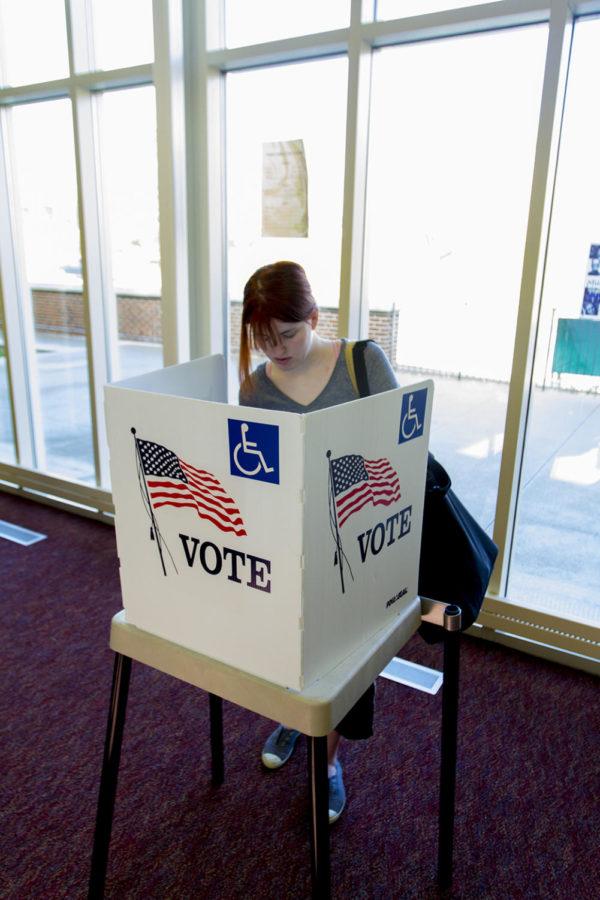Brown: Equality requires balance
Photo: Yanhua Huang/ Iowa State Daily
Samantha Nimmo votes for her choice Tuesday, Nov. 6, at the Collegiate United Methodist Church on Lincoln Way. Churches, schools and ISU residence halls were converted into polling locations for Election Day.
November 21, 2013
Sexism, racism and any other unjust discrimination are ugly realities. No one can reasonably say — even in today’s age — that these are merely unpleasant memories. The truth of the matter is, there are still those out there who view others as intrinsically lesser because of gender, skin color and a host of other personal or outward descriptions.
The response to these unfair attitudes has been getting better. No longer can employers legally pick and choose their employees or customers based on these arbitrary distinctions. No longer can violent acts committed in hate of a particular type of person go unseen in the eyes of the law for what they really are.
Among personal beliefs, things are hopefully getting better as well. There are undoubtedly still offensive beliefs that fly in the face of reason and acceptances of shamefully prejudiced comments or jokes, but these are not the all-pervading, mean spirited forms such hostilities used to take.
With these lingering attitudes, there have rightly been countless campaigns to raise discrimination awareness and to fight for equality in work, politics and nearly every sphere of life. Some of these campaigns, however, end up fighting battles for unequal treatment in their greater search for equality.
One of these groups is the well-respected Women in Politics Foundation. Its ultimate goal of seeing “greater parity with women occupying at least 50 percent of all national and statewide elective offices in the near future.” Sounds wonderful. It only stands to reason that if over 50 percent of our populace is female, we should expect nothing less than 50 percent of our elected representative to also be female, right?
Unfortunately for the foundation, that is not how our system of government works. We in the United States have what are called single-member districts, meaning that all of the people of a certain geographical area vote for their representative(s). We do not assign political office based upon the proportions at which various groups are found in our electorate.
Before you get any ideas otherwise, I am not suggesting that women (or any other historically discriminated group) cannot make effective politicians. Many people of every race, gender and creed can and do represent their fellow citizens perfectly well.
What I am suggesting is that it is wrong to have any bias toward one gender (or race, religion, etc.) over another. To their credit and to the credit of groups like theirs, the foundation is clear that they are supporting qualified women. However, the very idea that there is some quota which must be filled before equality is achieved is itself a discriminatory view.
Real equality does not necessitate a direct correlation between the demographics of every career or every political body and the demographic splits of our nation on average. What is far more important is an equality of opportunity (hence that oft-repeated line “[company name] is an equal opportunity employer”).
The problems with not engaging in discriminatory aid to those who are already at a disadvantage are clear, however. It is a self-perpetuating cycle that advantages certain groups, telling them and all others that they are better able or just plain better. When the prophecy usually comes true, it is monumentally difficult to overcome and change societal expectations.
These kinds of changes, when not accompanied by “reverse discrimination” are maddeningly slow. They are also real.
If it was somehow magically decided that in the next round of national and statewide elections, half of the winning candidates would be female, would that, in and of itself, mean that we were now a nation of gender equality? Of course not. While there is something to be said for people becoming accustomed to such changes only after they actually occur, our gender issues go deeper.
Valiant though the various works of advocacy groups everywhere are, the only way to real equality is for each equality revolution to be an organic, natural process. If it seems like such a landscape will never come, then we have more in common with our ancestors than we may think.
How incomprehensible would it have been for women who had just received the right to vote in 1920 that their daughters and granddaughters would make up almost 20 percent of our national Legislature? How ludicrous would it seem to those just removed from the shackles of American slavery that a mixed-race man would ever become president of the United States?
In an example that might very well come to fruition in the near future, it would be wrong to vote for a presidential candidate just because he is male. Under an assumption of equality, it would be just as wrong to vote for one merely because she is female.
It is good that many of us want to assist and bolster equality efforts in our country; that is a certainly an admirable and worthwhile ambition. However, every chance for equality needs balance. If historically discriminatory attitudes are on one side of equality, it can be tempting to jump as far to the other side as possible in a wild attempt at equilibrium.
Instead of giving in to that temptation, real advancement is best served by staying the middle course, slowly but surely drawing others into the same fine line of equality.







